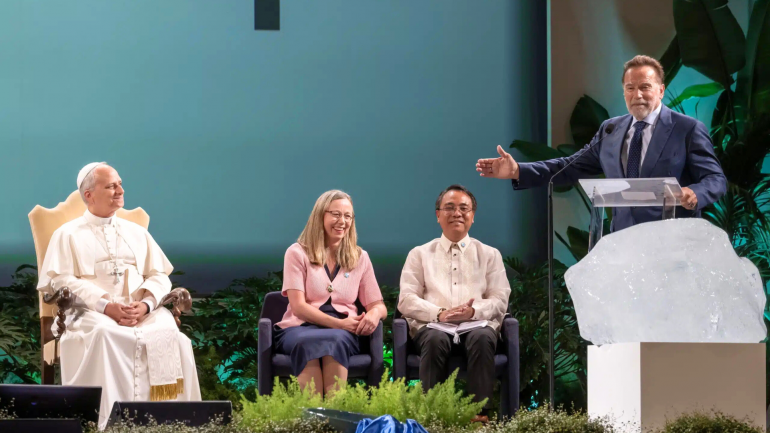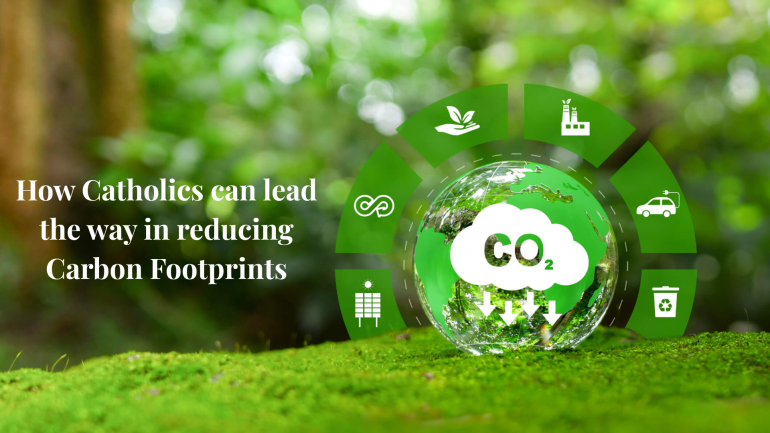How Catholics can lead the way in reducing Carbon Footprints

I have always been a fan of Arnold Schwarzenegger, the Austrian bodybuilder who made his way to the United States and, starting from scratch, rose to the top of the bodybuilding world. From there, he transitioned into films, despite his unusual accent, and later married into the Kennedy family, eventually becoming the Governor of California for two terms. A successful entrepreneur and public servant, he seemed to embody the American dream.
However, his life took a painful turn when an extramarital affair and the birth of a child out of wedlock led to the breakdown of his marriage. Schwarzenegger himself has called this one of the greatest regrets of his life. Yet, his candor in admitting his mistakes and taking responsibility helped people regain their respect and trust in him.
Reflecting on his life and how he bounced back from personal setbacks by refocusing on his vision for a better world, it was inspiring to read recently on Vatican News that he has partnered with the Vatican on the 10th anniversary of Laudato Si’ to fight climate change. Over 1,000 religious leaders, climate experts, and political figures gathered in Castel Gandolfo from October 1–3 for the “Raising Hope for Climate Justice” conference.
“God gave me this gift that can communicate the issue; I have the will, and I can see it, and I will do everything that I can to make this a better world,” said Mr. Schwarzenegger.
He emphasized that the 400,000 priests serving in 200,000 parishes around the world have “tremendous power” to bring about change if they are well-informed about environmental issues.
Mr. Schwarzenegger also praised the Vatican for its commitment to becoming the first carbon-neutral state in the world, saying that those who move beyond words and take real action “are the true action heroes.”
Indeed, change is essential if we are to improve our stewardship of the planet. Reducing our dependence on fossil fuels and increasing the use of renewable energy sources, such as solar power, are important steps forward. As Governor of California, a state that, if it were an independent nation, would be the world’s fourth-largest economy and home to many technology giants, Schwarzenegger strongly advocated for such initiatives.
It is truly heartening that the Holy Father has involved a leading public figure like Arnold Schwarzenegger in championing this vital cause and partnering with the Vatican.
In light of these developments, I would like to propose a few practical steps that individuals and organizations can take toward personal transformation and reducing their carbon footprint:

-
Conduct a Carbon Audit:
Organizations can start by commissioning a professional carbon audit to measure emissions and implement time-bound reduction plans. Many Indian companies have already done this; the Catholic Church could adopt this model globally. -
Measure Your Personal Footprint:
Use free online carbon calculators (e.g., carbonfootprint.com) to understand your lifestyle’s impact. You may be surprised, even daily habits like coffee consumption can have a significant footprint. -
Save Energy:
Switch to energy-efficient lighting (such as LEDs), maintain appliances regularly, and replace outdated equipment. Use air conditioners sparingly and at slightly higher temperature settings to reduce energy use and costs. -
Unplug Devices:
Many electronic gadgets consume “phantom power” even when not in use. Turn them off or unplug completely to save energy. -
Go Paperless:
Paper waste accounts for nearly half of business waste. Shift to digital communication, for instance, churches can send circulars via WhatsApp instead of printing pamphlets, especially during Advent and Lent. -
Reuse and Reduce Waste:
Encourage reusable bottles, cups, and containers at home, school, or work. Minimize disposable plastics and packaging. -
Dispose of E-Waste Responsibly:
Ensure electronic waste is sent to certified recycling centers to prevent environmental harm and global carbon inequities. -
Choose Sustainable Transport:
Walk, cycle, carpool, or use public transport whenever possible. Limit air travel and use virtual meetings instead, a positive shift encouraged by the pandemic. -
Work from Home (When Possible):
Even one day a week of remote work reduces commuting emissions and improves work-life balance. -
Buy Less and Buy Local:
Practice mindful consumption. Every product carries a carbon cost through production, packaging, and delivery. A minimalist approach benefits both the environment and personal finances.
Let us imagine the collective impact that 10,000 Catholic families could make by consciously reducing their carbon footprint at home. The effect would be far from insignificant. For instance, if each household saves even 50 dollars a month in energy costs by following some of the steps mentioned above, the combined effort would amount to half a million dollars saved every month, and, more importantly, a substantial reduction in the amount of energy that needs to be produced. This means a smaller carbon footprint and a cleaner planet for all.
It is essential to explore every possible way to reduce our carbon footprint and support climate action.
-
It’s not difficult to do. Even small choices, such as walking to the nearby store or church instead of driving, contribute to reducing emissions.
-
It won’t hinder your work. In fact, rethinking processes to minimize your carbon footprint often leads to greater efficiency and cost savings over time.
-
It’s not rocket science. As the examples above show, simple, practical steps are enough to begin the journey toward sustainability, both at home and in the workplace.
-
Embrace the change. Transitioning from petrol or diesel vehicles to electric ones may seem like a paradigm shift, but it is a necessary and forward-looking choice.
-
Every effort matters. Even if only one or two people in an organization or household begin taking action, their example can inspire others and contribute meaningfully to the global effort.
-
The collective impact will be immense. What matters most is that we begin today.
Let us commit ourselves to taking a step, however small, toward reducing our carbon footprint. In doing so, we leave this planet a little better than we found it.








